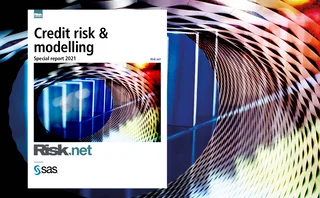
Credit ratings come into FX focus
Credit ratings are becoming increasingly significant to foreign exchange market players, with downgrades increasing in the current economic downturn, market participants told RiskNews ' sister publication FX Week .
Most counterparts have credit rating restrictions in terms of dealing, and controls are much tighter in the derivatives market - where contracts are long-dated - than in spot foreign exchange. Forex derivatives risk is also higher, as if left with a counterparty default, players will need to re-purchase any derivatives contracts, possibly at an inferior price. Therefore, many clients, such as central banks, asset managers and some major corporate firms, will only trade with counterparts who boast an AA rating.
"For derivatives, there would be a sensitivity below AA," said Tanya Azurchs, banks analyst at Standard & Poor's in New York. "Counterparties may ask for collateral, they may have smaller lines available and in some cases will refuse to do business." Azurchs also warned that the credit situation is unlikely to pick up in the near term.
Further downgrades could mean the banks with the highest ratings gain more forex business. "Obviously our triple-A rating is encouraging at any time, but it's a particular advantage at the moment," said a spokesperson at Lloyds TSB in London. She declined to comment on whether or not the bank had enjoyed increased volumes in the wake of recent downgrades to competitors.
"We believe our rating is a major asset and is more important than ever at the moment," echoed Christophe Bristiel, head of forex sales at AA-rated French bank Credit Agricole Indosuez in London.
Rating agencies have downgraded banks such as JP Morgan Chase, Morgan Stanley and Commerzbank during the past few months. But these investment banks are still in the double- or single-A categories and are rated higher or at the same level as many other banks.
A spokesperson for Commerzbank declined to comment on whether the bank's recent downgrade had affected its forex business. Morgan Stanley also declined comment.
But forex business at JP Morgan Chase has not been affected, said bank officials. "While we were disappointed by the recent downgrade, it has not affected our ability to deal. In fact our current rating brings us to a level consistent with many other forex participants," said David Puth, global head of forex at JP Morgan Chase in New York.
Only users who have a paid subscription or are part of a corporate subscription are able to print or copy content.
To access these options, along with all other subscription benefits, please contact info@risk.net or view our subscription options here: http://subscriptions.risk.net/subscribe
You are currently unable to print this content. Please contact info@risk.net to find out more.
You are currently unable to copy this content. Please contact info@risk.net to find out more.
Copyright Infopro Digital Limited. All rights reserved.
As outlined in our terms and conditions, https://www.infopro-digital.com/terms-and-conditions/subscriptions/ (point 2.4), printing is limited to a single copy.
If you would like to purchase additional rights please email info@risk.net
Copyright Infopro Digital Limited. All rights reserved.
You may share this content using our article tools. As outlined in our terms and conditions, https://www.infopro-digital.com/terms-and-conditions/subscriptions/ (clause 2.4), an Authorised User may only make one copy of the materials for their own personal use. You must also comply with the restrictions in clause 2.5.
If you would like to purchase additional rights please email info@risk.net
More on Credit risk
US bank CROs see only ‘modest’ credit risk from tariffs
Risk Live North America: Lower margins are early sign of stress, but Ally, Citizens and Pinnacle confident on loan books
Credit risk management solutions 2024: market update and vendor landscape
A Chartis report outlining the view of the market and vendor landscape for credit risk management solutions in the trading and banking books
Finding the investment management ‘one analytics view’
This paper outlines the benefits accruing to buy-side practitioners on the back of generating a single analytics view of their risk and performance metrics across funds, regions and asset classes
Revolutionising liquidity management: harnessing operational intelligence for real‑time insights and risk mitigation
Pierre Gaudin, head of business development at ActiveViam, explains the importance of fast, in-memory data analysis functions in allowing firms to consistently provide senior decision-makers with actionable insights
Sec-lending haircuts and indemnification pricing
A pricing method for borrowed securities that includes haircut and indemnification is introduced
XVAs and counterparty credit risk for energy markets: addressing the challenges and unravelling complexity
In this webinar, a panel of quantitative researchers and risk practitioners from banks, energy firms and a software vendor discuss practical challenges in the modelling and risk management of XVAs and CCR in the energy markets, and how to overcome them.
Credit risk & modelling – Special report 2021
This Risk special report provides an insight on the challenges facing banks in measuring and mitigating credit risk in the current environment, and the strategies they are deploying to adapt to a more stringent regulatory approach.
The wild world of credit models
The Covid-19 pandemic has induced a kind of schizophrenia in loan-loss models. When the pandemic hit, banks overprovisioned for credit losses on the assumption that the economy would head south. But when government stimulus packages put wads of cash in…







